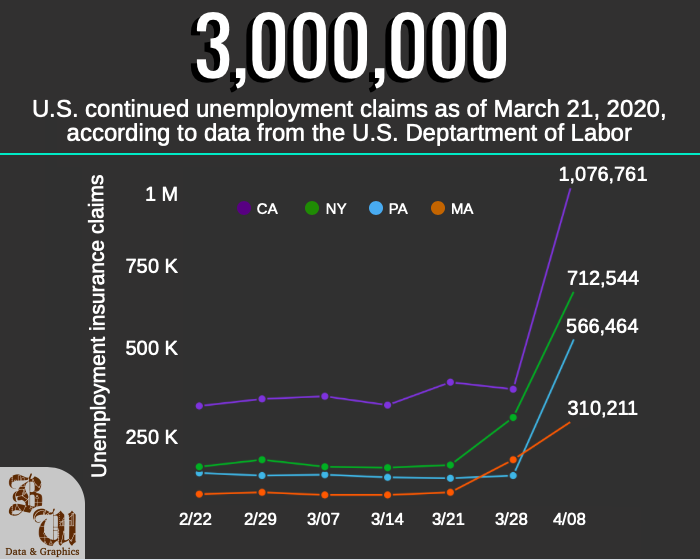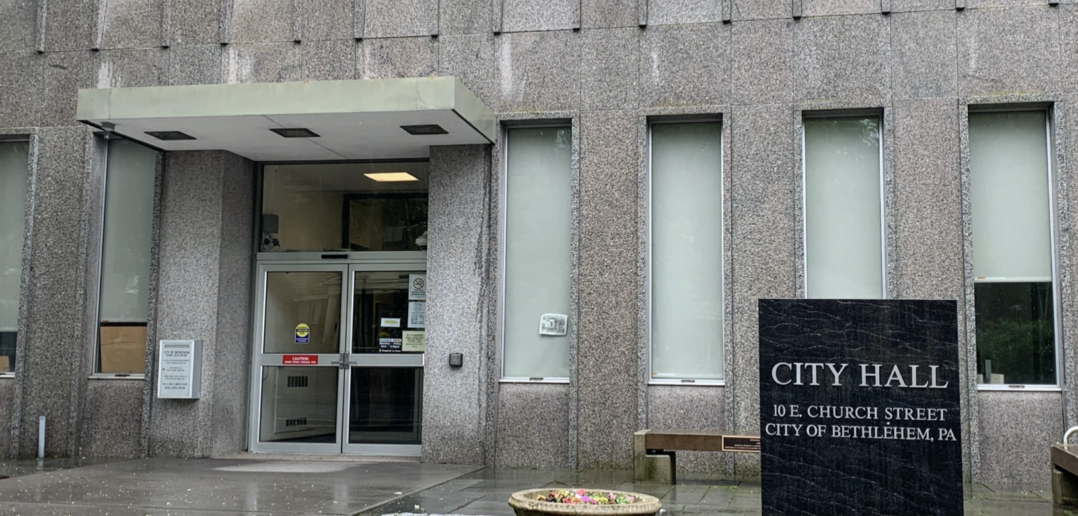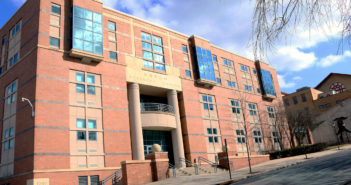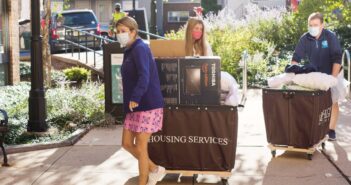Streets in downtown Harrisburg on Monday were packed with protestors angry over the continued economic shutdown across Pennsylvania caused by the rapid spread of the coronavirus.
Standing out among the crowd were American flags, pro-Trump signs and a sea of faces — many without protective masks — as people exclaimed their discontent with Gov. Tom Wolf’s stay-at-home order.
“Open up,” the protestors chanted repeatedly, referring to the crippling state of the economy in Pennsylvania and across the country.
Signs expressed discontent with the government, anger at the economic shutdown and urged lawmakers to choose economic freedom over fear, as speakers blared the rallying cries of people attacking the various measures taken to curb the spread of the virus.
“Stop Crying Wolf” was a popular sign held by protesters on the steps of the state Capitol building.
Protestors, young and old, also chanted “USA!” and “Jesus Christ,” cheering and honking horns in support of each speaker’s declaration.
“Never before has the government ordered the mass closure of tens of thousands of businesses, for any reason, let alone a virus,” one speaker exclaimed. “The government needs to prove its case in court!”
Dauphin County, where Harrisburg is located, has 368 confirmed cases of coronavirus and nine deaths.
Wolf insisted the state’s social distancing and stay-at-home guidelines were working in remarks earlier today.
“We’ve given up so much,” Wolf said. “And it has not been easy. But it has paid off. Our new case numbers have stabilized. And we have prevented the patient surges that we were all so concerned about and that we’ve seen in other places.”
Wolf took a few small steps toward re-opening the state’s economy when he announced construction can resume on May 8 in accordance with state guidelines. Auto sales can be conducted online and the Pennsylvania Liquor Control Board will now accept curbside pickup at 176 locations.
Additionally, on Monday he signed Senate Bill 841, aimed at helping local businesses and communities with the burden caused by the virus. The bill provides flexibility on property tax deadlines and allows for remote public meetings.
Economic impact hits Pennsylvania hard
New data from the U.S. Department of Labor presents a startling picture of Pennsylvania’s economic situation.
Weekly filings for unemployment insurance show a sharp spike in recent weeks in UI claims and in the insured unemployment rate. The insured unemployment rate is the number of people currently receiving UI as a percentage of the total labor force.
The insured unemployment rate spiked to nearly 10 percent in Pennsylvania during the week of March 28, which is the most recent week for which data is available. The insured unemployment rate had never crossed 2.83 percent for any earlier weeks in 2020.

Infographic by Micah Golomb-Leavitt/B&W Staff
New UI claims in Pennsylvania hovered between 12,000 and 16,000 per week for eight straight weeks between Jan. 11 and March 14. But between March 14 and 21, about 377,000 initial UI claims poured in, followed by about 400,000 the next week and about 277,000 new claims between March 28 and April 4.
The Bureau of Labor Statistics reported a 6 percent overall unemployment rate in Pennsylvania for the whole month of March 2020, up from 4.7 percent in both February and January.
Wolf implemented a stay-at-home order for seven of Pennsylvania’s 67 counties on March 23. The order was later extended to include all 67 counties on April 1 and will last until May 8, Wolf announced Monday.
All Pennsylvania schools have been closed for the rest of the school year.
Fiscal and medical challenges strike Bethlehem
Bethlehem’s Health Bureau is reporting 362 cases of COVID-19, 38 hospitalizations and two deaths. The city is reporting a positivity rate of 20.89 percent, a tick higher than the state’s positivity rate of 20.32 percent.
Both Northampton and Lehigh counties have positivity rates also above the state’s average.
The city’s data also shows African-Americans account for about 24 percent of coronavirus-related hospitalizations, despite only comprising 6 percent of Bethlehem’s population as of 2017. The trend of an overrepresentation of African-Americans suffering from COVID-19 has been documented nationwide.
While Bethlehem Health Director Kristen Wenrich said both St. Luke’s and Lehigh Valley Health Network have capacity at all their campuses, including adequate personal protective equipment for medical workers, testing is still a problem.
“There are shortages of testing kits,” Wenrich said in an April 16 forum. “At this point in time, I don’t have any insight as to when this will be resolved. I know the state department of health is actively trying to work in areas to have mass testing sites.”
Bethlehem City Hall remains operational while the building is closed to the public. Business Administrator Eric Evans discussed the ways in which the city is managing its finances amidst all the unknowns of the pandemic.
Evans noted the “relatively strong financial position” the city is in thanks to a “decade” of property value growth and downtown business success. Still, he expects a drop in city revenue in 2020, as well as in earned income tax and the issuance of new permits.
“In response, we need to drop expenses,” he said.
Evans said part-time city staff has been reduced and overtime has been reduced or “drastically cut back.” The city has implemented a hiring freeze, despite the 18 positions the city was previously looking to fill.
Easton and Allentown, however, have both furloughed over 80 workers each in efforts to save money.
While Bethlehem has a “number of infrastructure needs,” capital projects or purchases totaling nearly $7 million will need to be put off until 2021-22, Evans said.
Evans said the city is evaluating an array of aspects from their $80 million budget in order to save on expenses, and summer programming is one such area under consideration.
“When you need to do something this quick, it’s a little more difficult than when we might normally manage it over a period of months or years… and make changes more strategically,” Evans said in the April 16 forum with other city officials.
He noted some good news in the city’s attempts to manage its fiscal challenges when Wind Creek, the third largest item in Bethlehem’s budget, agreed to pay its $2.5 million annual fee to the city. According to lehighvalleylive.com, the casino has agreed to pay all its employees with benefits until May 31.
Bob Novatnack, Bethlehem’s director of emergency management, said in the April 16 forum that police, fire and EMS calls are all down recently. Novatnack requested citizens’ cooperation when dealing with public safety personnel as they adhere to CDC guidelines.
He said traffic in the city has been light and also stressed that the food chain in the city remains strong.
Bethlehem City Council will be hosting a virtual meeting on April 21 at 7 p.m.
Growing unease around the country
The discontent in Harrisburg follows a trend of defiance popping up in states around the country, as people rallied in the streets to protest stay-at-home orders.
Frustrated with a paralyzed economy, protestors are demanding that states allow for a reopening of businesses.
The protests have previously sparked at the state capitols of Minnesota, Colorado, Washington, Ohio, Michigan and Virginia. In some cases, health care workers have showed up in scrubs to counterprotest.
Florida, Texas and Ohio — among other states — have said they want to reopen parts of their economies by May 1 or sooner.
President Donald Trump unveiled his three-phase plan to reopen the economy on April 16. He said the usage of this plan would be at the discretion of state governors, and said in his daily press briefing that “this is a gradual process.”
Trump tweeted his support to “liberate” Virginia, Michigan and Minnestota one day after releasing his administration’s plan, following protests in all three states.
But against the backdrop of fear and anxiety over the nation’s economy, the coronavirus continues to infect Americans and cause death.
As of April 20, according to Johns Hopkins University, there are 761,964 confirmed cases of COVID-19 in the United States, with 35,314 deaths and 70,337 recoveries.
Northampton County has 1,441 confirmed cases and 36 deaths, while Lehigh County has 2,203 confirmed cases — the third-highest tally of Pennsylvania counties — and 32 deaths.
Philadelphia County has by far the state’s highest tally of cases and deaths — 9,038 and 262, respectively.
Pennsylvania is reporting that over 3,500 ventilators are not being used and are currently available for patients who need them. Over 2,700 patients are hospitalized with COVID-19 throughout the state at this time, according to the state’s Hospital Preparedness reporting site.






Comment policy
Comments posted to The Brown and White website are reviewed by a moderator before being approved. Incendiary speech or harassing language, including comments targeted at individuals, may be deemed unacceptable and not published. Spam and other soliciting will also be declined.
The Brown and White also reserves the right to not publish entirely anonymous comments.
1 Comment
I can sympathize with protesters who have lost their means of support but a group protest in these times borders on the idiotic. The political use of these protests is sad. Several states have decided to reopen in varying degrees. It might be a good idea to do so in one state or city as a test case but a general reopening seems to be a bad idea medically. The individualism of American often produces rewards this may be a time when it reaps wrath.